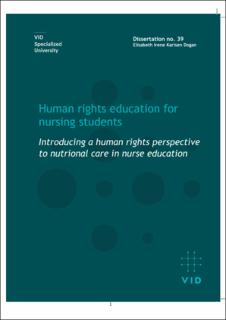| dc.description.abstract | Human rights are an important part of everyday nursing practice and care, but a human rights perspective has not been properly addressed in nursing education and practice. This does not mean that nurses are unconcerned with human rights issues, but that for most nurses, a human rights perspective is not an explicit foundation for conceptualization or practice. The aim of this study was to explore the experience of introducing a human rights perspective in nursing education. My research can be seen as both a contribution to the field of nursing education and to the field of human rights education. The study was conducted within the context of nursing education in Norway, focusing on the right to food for older adults in nursing homes-an area with longstanding challenges. Adopting a human rights-based approach (HRBA), a coursework on the right to food was introduced and developed, combining education on campus and in placement, where first-year nursing students had their first placement in a nursing home/long-term care facility.
The study design and methods were selected with the aim of capturing the complexity of a human rights perspective and professional development in a "real-life" context. Educational Design Research (EDR) appeared to be best suited to this purpose, as this research design looks into educational design in real-life settings. The methodology selected was comprised of focus groups, multistage focus groups and students' written assignments from their placements. It included the students' own perspectives and experiences, to foster empowerment and enable students' voices to be heard through participation and dialog-all of which are important from a human rights perspective.
Human rights education is an emergent field of educational theory. Here, Tibbits' theory and model was deemed especially relevant to this thesis, as she refers to duty-bearers like health professionals. Tibbits further points out the importance of learning though socialization, and for human rights to be a practice-oriented approach in people's everyday lives. A second theory that was selected for this thesis was Wenger's learning theory of communities of practice, since this theory further explores contextualized learning and learning as social processes. Wenger's theory has been seen as relevant in nursing education, since placement has characteristics of communities of practice where students are socialized into a profession. Lastly, as human rights can be understood from a range of perspectives, in this thesis, I explore how students learn about and promote human rights from the perspective oflfe's conceptualization of constructive rights.
The findings from the thesis highlight that nursing students’ learning about human rights can be enriched by integrating learning on campus with learning in practice, using other theories and concepts of learning beyond human rights education. Key to students’ learning and professional development were their relationships with nursing home residents, other students and nurses and health personnel. This underscores the importance of the role of patients and communities of practice in nursing education in human rights. Study findings show that human rights education that addresses the students’ own context made human rights both meaningful and relevant to them. In this study, when addressing human rights in a daily context of care, the students became aware that human rights are actually at stake in their own country. Awareness of human rights also seemed to help students make autonomous decisions regarding care following values related to social justice, but they were also dependent on a good learning environment in which they felt included. The ability to draw upon the language of human rights also seemed to enhance students’ accountability and support their navigation when they experienced rights violations during placement. This study highlights the necessity of integrating the language of human rights into nursing education in local contexts. Doing so may increase nursing students’ awareness of and commitment to promoting patients’ rights. The findings also indicate the importance of increasing nursing students’ ability to handle the complexity of the organizational structures in which they must provide nutritional and nursing care. This can be achieved by adding a human rights framework in nursing education and through supporting the students to benefit from the learning environment during placement.
A human rights perspective in nursing education aims at addressing challenges in healthcare related to systems and structures, dual loyalty and health professional rights—and to teaching student nurses to develop professional values like advocating for social justice, promoting dignity and respecting patients’ rights. A human rights perspective in patient care “zooms out” from the individual nurse–patient relationship towards examining systemic issues and state responsibility. In this regard, a human rights perspective in nursing care can complement and work parallel with care ethics and bioethics and involve ethical aspects that move outwards, from the individual as the professional who must make ethical decisions towards systems and structural challenges. Human rights education can benefit from being contextualized locally and in practice. This can enhance learning through one’s own experiences and through relations with others and may help promoting patients’ human rights and addressing everyday human rights challenges.
Paper I: Dogan EIK, Raustøl A, Terragni L. (2020). Student nurses’ views of right to food of older adults in care homes. Nursing Ethics, 27 (3), 754-66. https://doi.org/10.1177/0969733019884614
Paper II: Dogan EIK, Terragni L, Raustøl A. (2021). Student nurses’ experience of learning about the right to food: Situated professional development within clinical placement. Nurse Education Today, 98:104692. https://doi.org/10.1016/j.nedt.2020.104692
Paper III: Dogan EIK, Terragni L, Raustøl A. (2022). Human rights and nutritional care in nurse education: lessons learned. Nursing Ethics. Article first published online: February 7, 2022. https://doi.org/10.1177/09697330211057226 | en_US |
